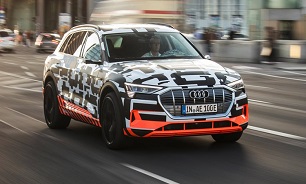Audi embraces electric future, internal combustion to remain until 2050
There's still life in fossil fuels, although hybrid power is spreading.

Khodrocar - Audi is embracing electrified mobility, but is under no illusions about the how long the transition from internal-combustion power will take, with the brand still investing heavily in traditional petrol and diesel engines.
As part of the Volkswagen Group, Audi is taking advantage of a wider push towards electrification, promising one in three cars it sells globally by 2025 will be fully electric of plug-in hybrid.
The first full-electric model for the brand, the e-tron, will go on sale in Australia next year, but Audi has already brought the Q7 e-Tron hybrid to lead the way.
By 2020, Audi Australia will have three electric vehicles on offer: along with the e-tron, we'll see a model based on the Sportback concept and a premium electric compact.
Nonetheless, Audi knows the internal-combustion engine (ICE) isn't going anywhere soon. Speaking to CarAdvice in Germany this week, Audi Australia corporate communications manager, Shaun Cleary, said the company expects ICE power to survive until around 2050.
That puts the full transition away from fossil fuel vehicles many decades away – and means significant improvements could be made to internal-combustion technology along the way.
It seems mild-hybridisation will become the norm across the Audi range much sooner than that, driven by the 48V system offered in the upcoming A6, A7 and A8.
"Globally we have said that it will make up one in three vehicles by 2025, so every third vehicle by 2025 will be full electric or hybrid," Cleary told us.
"But you can see that in cars like this [the new mild-hybrid A6] we are already taking steps.”
Using a belt alternator/starter system in combination with a 10Ah lithium-ion battery, the A6 can coast with its engine off between 55km/h and 160km/h (mainly downhill) and, when it comes to start-stop, can switch off from 22km/h while maintaining all other systems.
Though mild-hybridisation doesn't count towards the goal of one in three cars being electrified, it paves the way for consumer understanding and acceptance as the technology becomes more readily available. There's no denying their appeal is still relatively small.
"[It’s] small volume at the moment. I guess in realty it’s a step in the way on the way for the e-tron arriving in 2019, a full EV totally different concept but it also represents the future for e-tron and EV vehicles from Audi. We are really focusing on that. This is a step on the way.”
Like most other hybrids in Australia, the additional cost has made Audi’s single e-tron model to date, the A3, an unpopular choice.
"This sort of stuff is expensive, it essentially has two engines in the car and one of them is electric and cutting edge, so the buyer has to have the appetite to be receptive to that technology – to want that vehicle,” Cleary told CarAdvice.
No matter how we look at it, though, there is a clear move towards electrification from Audi as part of the Volkswagen Group.
It’s also evident traditional petrol and diesel engines will be used in some capacity and won't simply disappear – at least, not for a few decades.
Latest News


